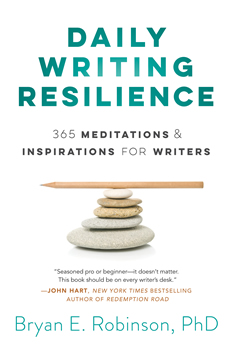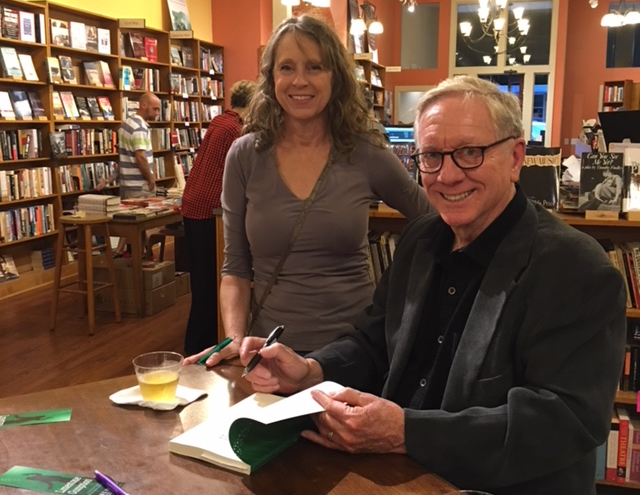

Inside Creativity: Bryan Robinson
Resilience: The Key Quality Thriller Writers Must Possess
By Bryan Eugene Robinson, Ph.D.
This is the first story in “Inside Creativity,” a new column running in The Big Thrill devoted to creativity, open to author members of ITW to write, as are our other columns, “Author Guided Tour,” “Get It Right,” and “Off the Page.” For more information on submitting a column, email thebigthrill@thrillerwriters.org.
“Writing is so difficult that I feel that writers, having had their hell on earth, will escape all punishment hereafter.” —Jessamyn West
 The dead aren’t supposed to walk among us, but they do. I’ve seen them—writers frazzled from publishing’s frenetic pace, spirits dead from unfulfilled and stressful career demands—empty shells, comatose like zombies moving among the living. I was one of them, too.
The dead aren’t supposed to walk among us, but they do. I’ve seen them—writers frazzled from publishing’s frenetic pace, spirits dead from unfulfilled and stressful career demands—empty shells, comatose like zombies moving among the living. I was one of them, too.
In the still, lonely hours before dawn, I plopped into the armchair, elbows digging into the knees of my ripped jeans. I dropped my head into my hands, grabbed a fistful of hair, and growled. After finishing my second murder mystery—my best work yet, or so I thought—the publisher informed me that the plot had a hole big enough to fly a 747 through. Rewrite after rewrite, confusion and frustration mired me. I wailed at the clock and shook my fist at the heavens. Distraught, I didn’t know what else to do but give up.
Dry-well syndrome.
That wasn’t my first book. I was actually a veteran writer with 37 non-fiction and fiction books and numerous magazine articles under my belt. I decided to put the manuscript aside to provide an incubation period for my creative juices, and I enrolled in a workshop led by a literary agent at an annual thriller conference. She spoke on the eight top qualities for successful writing. Guess what she listed at the top? I was flabbergasted when she said, “The number one key to writing success—even more important than good writing—is perseverance, dogged determination in the face of disappointment.” I was even more flabbergasted when I realized that there are tons of books on writing craft but practically nothing on the craft of perseverance and resilience.
That’s when I decided to change strategies in order to reclaim my creative mojo. I wrote a synopsis for the first daily meditation book for all authors but especially for mystery/thriller writers: Daily Writing Resilience: 365 Meditations & Inspirations for Writers, publishing in 2018. Writing the book restocked my writing reservoir, energized and emboldened me. After finishing Daily Writing Resilience, I went back to my murder mystery, sat down, and finished the novel Bloody Bones, ending up with a second book to boot.
Someone will tell us no every step of the way on our writing journey. Craft alone won’t carry us through the meteoric writing hurdles—setbacks so great it can feel as if we’re pushing through relentless steel, a vein of encased ore: an impossible deadline, heartbreaking rejection, agonizing writer’s block, a lousy review, sounds of crickets at book signings, or the rumble of our own self-doubt. Statistics show that more of us have the stamina to continue to take safety risks after a car crash than to continue after a series of psychological defeats.
Only the diligent survive the writing business. Lee Child and Patricia Cornwell have it. So do Steve Berry, Barbara Neely, and John Lescroart, as do Mary Higgins Clark and Stephen King. A-list writers work long and hard and face tumultuous ups-and-downs before the taste of success. After repeated failure, many less fortunate scribes fall into the what-the-hell-effect—a way out and permission to give up, throwing in the towel so they don’t have to keep feeling the pangs of disappointment. Adding insult to injury, they seek comfort in the very thing they’re trying to conquer: writing failure. But running from writing challenges to bring quick relief to the misery of defeat robs us of knowing what missed opportunities lay beyond the barriers.
Growth as a writer is painful, but for those of us with ink in our blood who want to bloom, it’s even more painful to stay safe in a tight bud. We often hear the refrain that in order to be a successful writer, we must write every day. Although I agree, the act of writing itself is not the secret mojo. The secret weapon that determines our degree of success is the mindset with which we write.
Some writers are more successful than others because they have what is known as a growth mindset, basically a winning frame of mind. They never give up and view obstacles, disappointments, and setbacks as opportunities to grow without avoiding or caving into them. They ask not how their writing life is treating them; they ask how they are treating their writing life. Their mojo is an undying love for writing, not fame or money. Award-winning mystery writer Barbara Neely said, “I never stopped writing. I just stopped trying to get published.”
Resilient writers think of success and rejection as a package deal: if we want to accept writing success when it comes, we must be willing to accept writing defeat when it happens. And that doesn’t mean forfeiting our craft. Resilient writers cultivate the mindset that writing disappointments happen for us, instead of to us. They make it a goal to welcome writing setbacks, no matter how painful, frustrating, big or small—as lessons from which to learn. They ask, “What can I manage or overcome here?” or “How can I turn this matter around to my advantage?
The findings of neuroscientists provide consolation. Just as grass grows through concrete, a resilient zone exists inside each of us. Once we find and live from that place on a daily basis, we discover that the power within is greater than the challenges before us. We cultivate creative sustainability like an elastic band that bends and stretches to a point before springing back higher than we fall. We face defeats by taking the towel we want to throw in and use it to wipe the sweat off our face then hop back into the saddle of writing.
Over time, we grow thick skin, resilient to the rejections and letdowns that are sure to come. For inspiration, resilient writers look up to our accomplished predecessors on whose shoulders we stand—successful writers who stared writing obstacles in the eye and kept on going. When the nail on the wall would no longer support the weight of his rejection slips, Stephen King replaced the nail with a spike and kept on writing. Thriller writer Steve Berry rose to acclaim following 12 years and 85 rejections. After 10 years and a box full of rejection letters, Janet Evanovich took the container to the curb and set it on fire. These are just a few examples of well-known stress hardy writers.
Many of the greats from a variety of fields have a growth mindset. Billie Jean King had it with tennis. Michael Phelps with swimming. Meryl Streep with acting. A famous quote by baseball great Babe Ruth, arguably one of the best ballplayers of all time, reflected a resilient attitude: “Every strike brings me closer to the next home run.” We can employ Ruth’s wisdom in our writing pursuits and tell ourselves that rejection and failure bring us closer to our writing dreams. So let’s stop throwing the book at ourselves, throw ourselves at the book, and keep swinging with that winning mindset until we hit our dreams out of the park.
- THE GOD IN THE SEA with Paul Kemprecos - April 4, 2024
- FOR WORSE with L. K. Bowen - April 4, 2024
- HIT AND RUN with Vincent Zandri - April 4, 2024


